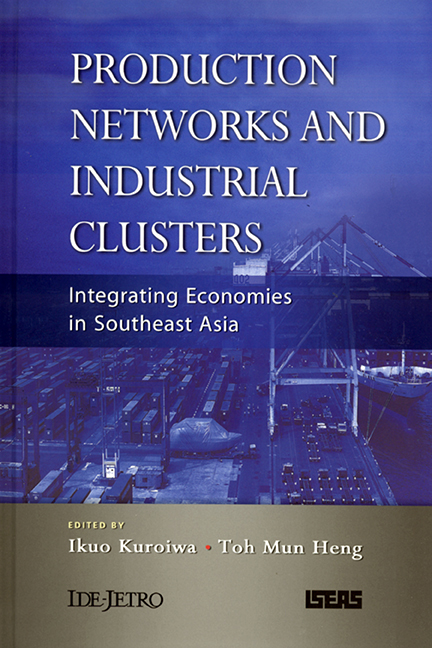Book contents
- Frontmatter
- Contents
- List of Tables
- List of Figures
- Preface
- Acknowledgements
- Contributors
- 1 Introduction
- I Overview of the Production Networks and Industrial Clusters in Southeast Asia
- II Case Studies
- III Drivers for the Expanding Production Networks
- 8 Supply Chain Management and Logistics in Southeast Asia
- 9 Regional Economic Cooperation and Production Networks in Southeast Asia
- 10 Concluding Remarks: Implications for Public Policy
- Index
10 - Concluding Remarks: Implications for Public Policy
from III - Drivers for the Expanding Production Networks
Published online by Cambridge University Press: 21 October 2015
- Frontmatter
- Contents
- List of Tables
- List of Figures
- Preface
- Acknowledgements
- Contributors
- 1 Introduction
- I Overview of the Production Networks and Industrial Clusters in Southeast Asia
- II Case Studies
- III Drivers for the Expanding Production Networks
- 8 Supply Chain Management and Logistics in Southeast Asia
- 9 Regional Economic Cooperation and Production Networks in Southeast Asia
- 10 Concluding Remarks: Implications for Public Policy
- Index
Summary
Using concepts and insights of value chain analysis, production fragmentation, and cluster analysis, this book investigates the development and establishment of production networks in Southeast Asia. In particular, it has considered three case studies of industries which strive hard to plug into the production networks in Southeast Asia. It also discusses opportunities and challenges for industrial upgrading through participating in the global economy using the GVC and GPN approach.
It is evident from the case studies that countries by being part of production networks reaped benefits from them. Also, industrial clustering and agglomeration economies played important roles in strengthening the competitiveness of industries. The experience in these countries offers valuable lessons for other developing economies which hold the aspiration for growth and development. Prospering in the global economy requires new ways of thinking about economic development and new strategies to catalyze growth. The lessons that can be learnt from the Southeast Asian case studies are described in the next few sections.
ABSORPTIVE CAPACITY OF THE ECONOMY
For a country to participate in production networks, the country should have an economy with absorptive capacity. Absorptive capacity is especially pertinent when it relies on foreign capital and technology to initiate the industrialization process. Besides the availability of basic physical infrastructure, the workforce must acquire basic literacy and numeracy. Then, as the industry grows, they must acquire more specialized skills and knowledge.
A developed financial system is another key component of a country's absorptive capacity. It is also a key determinant of capital inflows because, without a strong and stable financial system, inflows of foreign capital in response to domestic fiscal incentives can engender undue strain on the money supply, unwarranted appreciation of the domestic currency and resultant low competitiveness of exports (Nkusu and Sayek 2005). Financial cooperation among regional players also helps in enhancing the absorptive capacity of a country.
HUMAN CAPITAL FORMATION
Human capital formation is important for successful participation in production networks as well as for growth of competitive clusters. Empirical studies have substantiated a strong link between economic successes of high performers in Southeast Asia and sound policies for human capital formation. For example, it is believed that foreign companies had utilized pre-existing stocks of intellectual capital as the basis for highly efficient manufacturing operations in the host country (Noorbakhsh, Paloni and Youssef 2001).
- Type
- Chapter
- Information
- Production Networks and Industrial ClustersIntegrating Economies in Southeast Asia, pp. 335 - 339Publisher: ISEAS–Yusof Ishak InstitutePrint publication year: 2008

